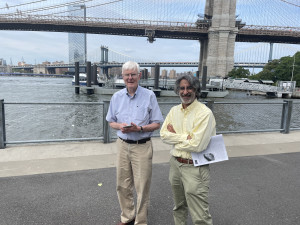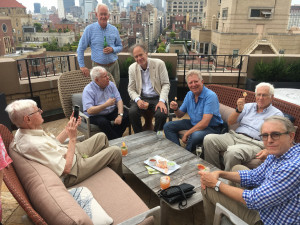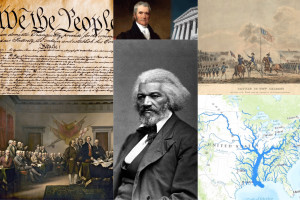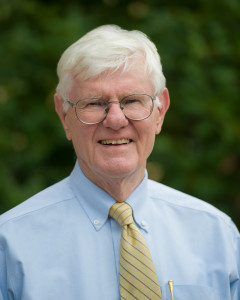Reverberations of the Revolution
Akhil Reed Amar, Yale University
Gordon Wood, Brown University
Paul Grimstad, Yale University
EverScholar in Florida
January 11-14, 2024
Boca Raton, FL
$2395 per person
America’s Revolution was a momentous and transformative event, At the beginning of the imperial controversy with the monarchy of Great Britain, America was only a collection of thirteen disparate colonies with about two million settlers huddled along a narrow strip of the Atlantic coast—European outposts whose cultural focus was still three thousand miles away in London, the metropolitan center. Yet scarcely fifty years later, following a second war with Britain, these hitherto insignificant provinces had become a single sprawling continental republic with nearly ten million citizens, “a large and unexpected portion” of whom, as the most important newspaper of the era, the Niles’ Weekly Register, put it in 1815, had already spilled into the lands beyond the Appalachian mountains—a huge expansive money-obsessed nation whose cultural focus was no longer abroad but inward at its own boundlessness.
The course will examine the nature of the Revolution and assess its revolutionary nature. Its radicalism and its transformative character cannot be understood without an appreciation of what came before, of the colonial period, of America’s ancien régime, so to speak
Over the past four or five decades many academic historians have been engaged in a major effort to disparage the history of America in the hopes of creating what they believe will be a better and more virtuous society. Because the American Revolution is the most important event in American history, bar none, much of the criticism has focused on it.
Although many academic historians in the first half of the twentieth century had disagreed with one another over interpreting the Revolution and had often ascribed sordid and pecuniary motives to its leaders, few historians if any of earlier generations had ever questioned the actual worth of the Revolution. That’s no longer true. The present generation of academic historians sees little that is positive coming out of the Revolution. Instead, these recent historians tend to stress the failures of the Revolution. As one historian put it in the 1990s, the Revolution “failed to free the slaves, failed to offer full political equality to women, . . . failed to grant citizenship to Indians, [and] failed to create an economic world in which all could compete on equal terms.”
Such anachronistic statements suggest a threshold of success that no eighteenth-century revolution could possibly have attained, and perhaps tell us more about the politics of the historians who make such statements than they do about the American Revolution itself.
No account of the Revolution can ignore slavery, the fate of the indigenous peoples, and women of all races. But to make sense of the nation’s subsequent history, the story of the Revolution and its reverberations has to encompass much more than its limitations and failures.
Colonial society was not modern. Patron-client relations existed everywhere, and large numbers of people were unfree, either servants or slaves. As feeble as they might have been, hierarchy and patriarchy still dominated the social order. But all that was about to change with the imperial crisis of the 1760s and 70s.
By 1776 Americans knew they were launching a grand experiment in republican government. They were confident they could by their own efforts remake their culture, create anew what they thought and believed. Their Declaration of Independence told them that their equal status at birth did not determine what they might become. Suddenly, everything seemed possible. The revolutionary leaders were faced with the awesome task of creating out of their British heritage their own separate national identity.
Americans now had the opportunity to realize an ideal republican world, to put the Enlightenment into practice, to create an ordered virtuous society and an illustrious classical culture that men since the Greeks had yearned for. Nearly all the new republican states proposed a variety of enlightened reforms. These included blueprints for three-tiered systems of public education, new Beccaria-inspired plans for criminal punishment, the disestablishment of the Church of England along with greater separation of church and state, new laws of inheritance, and, perhaps most important, the abolition of slavery and other forms of unfreedom.
Little worked out in the way the Revolutionary leaders expected. Middle-class politicians vaulted into power in the states and the society became excessively democratic and vulgar. By the third decade of the nineteenth century it seemed to many that American society was coming apart. Many of the traditional ties and adhesives that had bound people to one another were disappearing and something that the visiting Frenchman Tocqueville called “individualism” was coming to dominate American society.
So – what are we to make of the Revolution, all in all? We will surely explore these ideas that were integral to and the nation that sprung from this singular event. Beyond this, however, we will look at those ensuing decades, into the 19th century, and see how all these things shaped the new republic; whether and which ideals were enduring and remained influential; whether they were hollowed out or even abandoned; and what all this means for the so-called “idea of America.”
But America was not “just” an idea – it was a new legal, juridical system. But what kind of system? In 1776, was America one nation or thirteen? What about in 1789? In what ways were the so-called “United States of America” united? Why did this matter? How does this set of questions connect to American ideals, both at its founding, and going forward?
We are uniquely privileged to undertake this journey with the most extraordinary leaders imaginable. Professors Gordon Wood, the greatest living historian of the Founding, Professor Akhil Reed Amar, the greatest scholar, theorist, and historian of the American Constitution will lead us through the events and their implications as no others could, and they will be joined by a prominent expert on the expression of these ideas and ideals as they were written by the Americans and their observers themselves – by Emerson, by Tocqueville, by Jefferson, and many others. The history of ideas is best studied by including the best expounders and chroniclers of those ideas, and therefore Professor Paul Grimstad, Director of Undergraduate Studies for the Humanities Department at Yale, caretaker of the Directed Studies legacy, and teacher of “The American Imagination,” winner of Yale’s highest teaching award, will bring those thinkers and writers to our door.
Join us as we feast on the richest material with the finest faculty, with the greatest experts on beautiful ideas expressed in the most magnificent words, for three days of exuberant immersion together.
Our Faculty:
Readings
All EverScholar courses actually start months before our meeting. After registration, you will receive all books and scholarly articles for the course, and will immerse yourself in great works curated by our faculty. “Reverberations of the Revolution” is no exception, with works ranging from contemporaneous writings to great books written by your own EverScholar professors. Primary sources will mix with authoritative texts to produce night after night of joy as you prepare for your return to the life of the mind.
Special Events
One of EverScholar’s unique and most beloved features are our Special Events; sessions at a number of well-known (such as a museum or Art Gallery) or less-known centers of collection and learning. “Reverberations of the Revolution” continues this tradition. Details of the Special Events for this program will be provided before the program begins.
Beyond the Classroom
Everything that happens during an EverScholar program is enhanced by the fact that it takes place in a learning-promoting environment.
This program will take place in beautiful Boca Raton, Florida in January – ’nuff said, perhaps. EverScholar has arranged for a discounted block of rooms at the beautiful Waterstone Resort and Marina – see photos below. The learning environment will enhance our classes both in beauty and the nature of the location.
Learn more about the experience!



The course begins with a reception and dinner on Thursday…. and ends in late afternoon Sunday. The program cost is $2,395 per person. Deposit is $500 per person. Balance is due on November 1, 2023. Cancellation refund and COVID-19 refund policies are detailed on the registration page – so you can register without worries.
All EverScholar program attendees are required to be fully “up-to-date” on covid vaccination; we also require rapid testing on the day the course begins.
Looking forward to seeing you there!



